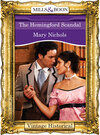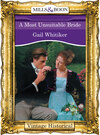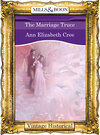Kitabı oku: «Princess of Fortune», sayfa 3
“My orders from the admiralty must come first, ma’am.” He was working so hard to stop her without hurting her, that, under any other circumstances, she would have laughed out loud. “Damnation, why won’t you show a little sense and stop this?”
“Because I am a Fortunaro princess, Captain,” she said furiously, her temper finally spilling over, “and the Fortunari do whatever they please.”
Abruptly the carriage halted, throwing the captain off balance, and swiftly Isabella jerked her arm free of his grasp. She unhooked the latch on the door and shoved it open, the ribbons on her bonnet blowing up across her face as she teetered on the edge. She’d come too far to change her mind now, and before the captain could pull her back, she stepped from the carriage, her head regally high.
But she’d neglected to wait for the footman to open the step for her, and instead of descending grandly from the carriage, she pitched forward through the empty space in a tangle of red velvet and landed hard on the pavement on her hands and knees, without any grandeur at all.
“Ma’am!” At once the captain was there at her side, kneeling on the pavement beside her. “Are you injured? Should I send for a surgeon?”
“Of course I am not hurt,” she snapped, scrambling back to her feet and brushing him away as well as the two footmen. The palms of her hands stung inside her gloves and she was quite sure her knees were bruised and scraped, but she would never give him the satisfaction of admitting it. Even if a Fortunaro princess might be foolish enough to leap without looking, she would keep the resultant suffering to herself. “I am not some piece of delicate porcelain, to be shattered with such ease.”
He looked relieved. “Then let me help you back into the carriage.”
“Why should I do that?” She straightened her bonnet, retying the ribbons, and looked up at the sign over the shop before her. At least they’d stopped before one she’d plausibly visit, the windows filled with an enticement of bonnets, gloves and ribbons. “We shall go inside here, Captain, to—to Copperthwaite’s Millinery. Yes, that is my wish. A fine shop is not like an open street. There can be no danger to me inside. I shall be quite safe.”
She smiled, proud that she’d made her mouth bend around those awkward English words. Walking forward toward the shop took effort as her bruised knees protested, but through sheer will she kept her smile in place and didn’t wince. Other people were watching, curious and listening, eager to be able to describe any mistake she might make, and she was determined to earn their admiration, not their contempt.
“You can’t do this, ma’am,” said the captain in an impatient whisper as he walked beside her. “It’s not wise.”
“Then I am not wise, because I cannot see reason or cause for not entering this shop.” She was enjoying herself now, relishing the attention of the growing well-dressed crowd on the sidewalk around them, and she raised her voice so the others might hear her. “How am I to earn support for my dearest Monteverde here in London if I never show myself to the English people?”
An excited murmur rippled through the crowd, and she smiled just enough to acknowledge it. This was a part of being her that she’d missed, a part that the captain couldn’t understand, and how could he, really?
One of the footmen hurried to open the shop’s door for her, and she sailed inside. Because Mama had always insisted upon having the dressmakers and jewelers and everyone else come to her at the palace, Isabella had no firsthand experience with shops, and she gazed about this one now with unabashed curiosity.
One long room was lined on either side with pale green counters, and cushioned chairs for customers. While most of the goods were hidden away in the drawers of the tall cabinets behind the counters, special selections had been artfully arranged here and there to catch a buyer’s eye: wide-brimmed leghorn hats with silk flowers, pastel kidskin gloves, veils and ribbons and stocking and garters. Isabella couldn’t imagine having such a selection to choose from, and for once it actually did seem as if the common women might have the advantage over her and her mother in the palace.
With the gracious smile still on her face, Isabella stopped just inside the doors, waiting to be properly recognized and greeted. Every shop girl had already turned to look, as had every customer, and Isabella beamed at the attention. Surely in such a center of fashion as this she would be recognized; surely no assassins could be lurking here.
An elegant older woman glided toward Isabella, the curled ribbons on her cap floating gently around her cheeks. She dipped a genteel curtsy, and Isabella nodded in return.
But Mrs. Copperthwaite wasn’t noticing. “Good day, Captain Lord Greaves, good day! We are so honored to have you visit us—a gentleman of your heroic reputation!”
Beside Isabella, the captain bowed. “Thank you, ma’am,” he said. “You’re far too generous with your praise. All I did was for my country, nothing that any officer of the king wouldn’t have done in my place.”
“Oh, no, Captain my lord, I would dare differ!” exclaimed Mrs. Copperthwaite. “You are a hero, Captain my lord, and I will not have you argue!”
Mrs. Copperthwaite sighed and clasped her hands before her breasts in a way that Isabella found annoyingly overwrought. A hero, a hero, thought Isabella crossly. If this captain were such a great war hero, then why was he mired here on land, making her life so miserable?
Mrs. Copperthwaite sighed again, at last recovered. “Pray, pray, what shall you have this day, Captain my lord? How might we oblige you?”
“Nothing for me, ma’am,” said the captain. Even with the shopkeeper so shamelessly fawning over him, he was still watching out for Isabella’s safety, his eyes roving all over the counters and cabinets and other customers as he looked for danger. “Though likely my sisters would disagree.”
“Then for—for your friend.” Finally Mrs. Copperthwaite turned to Isabella with a distinctly slighter curtsy. “How might we serve you, miss?”
The shop owner’s expression was respectful enough, but her appraisal was so open—taking in everything from Isabella’s heeled slippers to the plume on her hat, and especially the un-English velvet and gold gown in between—that Isabella knew at once what lay behind it. Because she wasn’t dressed like a milky-mousy English lady, she must be a—a harlot.
“I am not this man’s mistress.” Isabella drew herself up with regal disdain. “I do not know what should give you such a ridiculous idea.”
Beside her, the captain made a growling grumble deep in his throat, and already she knew what that meant, too. He wanted her to behave.
“Mrs. Copperthwaite has said nothing of the sort.” His voice had a forced lightness to it, more warning for Isabella. “She intends no insult to you. She doesn’t know who you are, that is all.”
Isabella didn’t deign to look at him. Most likely he was right about this Mrs. Copperthwaite—if the woman wished to keep her trade, she could ill afford to make any judgments about her customers—but Isabella had no wish to admit to the captain that she’d been wrong. Royalty never did that.
“Then tell her who I am, Captain,” she ordered. “Tell them all.”
His dark brows came together, and the little muscles along the line of his jaw twitched. “That would not be wise.”
“Oh, you are too stubborn!” Without thinking, she lapsed into Italian, flinging her shawl over one shoulder, tassels flying. “Haven’t we already determined that I shall never be a wise woman, not by your preposterous standards?”
Not only was his jaw twitching, but along that same jaw a mottled red flush was now spreading from the immaculate white linen of his shirt.
“Your wisdom, or lack of it, is not my affair,” he said, also in Italian. “Your welfare and safety are. Few in London know you are here, but if you choose to announce yourself like this, in the middle of Copperthwaite’s, then I’ll guarantee the scandal sheets will be filled with it tomorrow.”
“Saints in heaven, what if they are? It will still be your duty to protect me, won’t it?”
“It will,” he said, “but you’ll also make it a damned sight more difficult. Now come, you’ve done enough damage here. Back to the carriage before—”
“Oh, Your Royal Highness,” cried a startled voice in the same Italian. “It is you! Praise the merciful Mother, it is you!”
A small, dark woman in a plain seamstress’s cap and apron rushed from behind the counters toward Isabella. Her round-cheeked face and her singsong dialect could have belonged to any woman in a Monteverdian market, and because of it Isabella smiled, touched by such an unexpected reminder of home.
But before the woman came closer, the captain lunged forward and grabbed her around the waist, jerking her back against his chest. The woman shrieked and fought him, struggling to break free as he caught her right hand and held it firmly in her grasp.
“Maria!” Mrs. Copperthwaite said sharply. “Maria, stop this at once and explain yourself!”
Still the woman plunged and kicked, while only Isabella and the captain knew that she was spewing out the vilest, most profane insults imaginable against every member of the Fortunaro family. She kept the fingers of one hand clenched tightly, and as she tried to twist around toward the captain, the light caught a flash of a polished blade. Shocked, Isabella could only stand and watch, her welcoming smile now frozen on her face.
“Drop it now.” His voice was harsh, efficient. “Save yourself, and surrender.”
“To the devil with you, you English bastard!” she cried, breathing hard with desperation as she tried one last time to twist free. “You deserve to die for defending the royalist bitch!”
But the woman’s strength was spent. The captain pried the woman’s clasped fingers open, and a sharp-bladed pair of sewing scissors dropped to the floor with a clatter. Gasps and ladylike murmurs of horrified surprise rippled through the other customers and shop girls, while the other seamstresses crowded in the doorway to the workroom they were never supposed to leave.
“Send for the constable,” said the captain. “Now.” Obeying instantly, one of the shop girls ran into the street.
Two of the footmen had hurried to relieve him, each taking one of the woman’s arms to hold her until the constable came. Calmly the captain collected the scissors from the floor where they’d fallen, and wrapped them in his handkerchief before he slipped the little bundle of evidence into his pocket. He ignored the woman now, her cap gone and her hair bedraggled and tears of fury streaming down her face as she continued her stream of curses and threats.
But Isabella didn’t have the power to ignore it. She felt the woman’s hatred wash over her like a wave, the intensity of it shocking and confusing, too. Then she noticed the crude necklace that had slipped free of the woman’s kerchief when she’d struggled with Tom. Only Isabella had recognized the tiny triangle of twigs bound with red thread on a black cord.
Isabella knew the symbol, yet she didn’t: a family sign, Anna had told her. But what kind of family—what kind of violence—would link Anna to this woman, and now to Isabella herself?
She felt shaken, her knees trembling and weak beneath her. She’d always believed her father was a good man, and a good king, as well. Buonaparte was the despot, not Father, and as soon as the French could be driven out, the people would rejoice and welcome Father back to his throne. That was the truth, wasn’t it?
Wasn’t it?
Because of Father—because of her entire family—this woman had wanted her dead, and if the captain had not jumped between them, she would have succeeded. Isabella had never seen anyone risk their own life for hers, and the responsibility of it scared her, too. What if the captain had been hurt or even killed trying to save her, simply because she’d insisted on being unwise?
Yet when he came to her now, she saw only concern for her welfare in his face: no reproach, none of the blame that she knew she deserved.
“You are unharmed, ma’am?” he asked her in a gruff whisper. He still spoke in Italian, for her, and that small thoughtfulness was nearly enough to make her weep. “You’ll be safe enough from her now, you know.”
“Oh, Captain my lord, I am so sorry this has happened!” Mrs. Copperthwaite was flushed and distraught, seeing a scandal that could destroy her business. “How was I to know the creature was mad? She has not been a fortnight in my employ, and I only took her in from pity, and because her stitching was so fine, but now—now the only place fit for her will be the gaol!”
“The woman must be tried under your English law.” Isabella spoke again in English. She knew she must be strong and calm, a Fortunaro lioness, and not let anyone see the terror that still hammered in her chest. “Then I am sure she will receive the punishment she deserves.”
“You show great character and courage, miss.” Mrs. Copperthwaite’s smile had a desperate edge. “No wonder Captain his Lord Greaves counts you among his acquaintance, miss.”
The seamstress twisted again in the footmen’s grasp, just enough so she could spit at Isabella’s feet.
“Ha, she is no miss!” she shouted in English, making sure everyone would hear. “You do not know who she is? You do not know?”
“Quiet,” ordered the captain sharply. “You’ve said enough.”
But the woman only laughed, even as the two men that held her half dragged her toward the door.
“She is the only daughter of the villainous royal oppressor of the Monteverdian people!” she shouted over her shoulder. “She is the Princess Isabella di Fortunaro, may she burn forever in the hottest flames of hell!”
Chapter Four
M rs. Copperthwaite gasped, audible to all in the suddenly silent shop. It was equally evident that she was reappraising the princess, trying to shift her opinion of the young woman’s flamboyant dress from that of a gaudy actress or mistress to exotic, eccentric royalty.
“Is this—is this so?” she asked tentatively. “Are you truly—”
“Yes,” the princess said softly, her voice scarcely more than a whisper. “I am.”
“Oh, my goodness.” Mrs. Copperthwaite’s hand fluttered over her chest. “Oh, Your Royal Highness, forgive me!”
She sank into a deep curtsy before the princess, her head bowed and meek. One by one, all the other women in the room followed, graceful dips of crushing pale linen and silk.
It was like nothing Tom had ever witnessed, a scene better suited for the boards at Covent Garden than a Bond Street milliner’s: a melodramatic capture, the princess’s true identity revealed by her would-be assassin, and then in unison every person in the whole wretched shop dropped in an awestruck curtsy. The princess herself couldn’t have choreographed it for more self-centered grandeur.
And yet Tom saw at once that she wasn’t enjoying the spectacle at all. Although he’d easily thwarted her attacker, the surprise and shock had shaken the princess in ways he hadn’t expected. She wasn’t accustomed to real danger like that he’d encountered all his life, and it showed. She’d turned uncharacteristically silent, for one thing, and inside the black brim of her bonnet her face had gone as white as bleached linen, her dark eyes enormous with fear and her mouth pinched. All of her imperious mannerisms had fled, and what was left made her seem very young and very, very vulnerable. She’d stopped being the grand royal Monteverdian princess, and become like any other young woman abruptly confronted with her own mortality.
Thomas held his elbow out for her to take, and when she didn’t, he gently captured her little gloved hand himself and tucked it into the crook of his arm. Following his orders, he had wanted to remove her from the store before anyone learned she was a princess. Now, with that secret gone, he realized how much more important it was for the woman herself that he extricate her from this situation as soon as he could.
“Shall we leave now, ma’am?” he asked. “The carriage is just outside.”
She nodded, and took a shuddering breath as she turned toward Mrs. Copperthwaite. “You may rise. No such ceremony is necessary.”
“Oh, but it is, ma’am!” The older woman straightened, her eager smile proof of how much she wished to gain a royal customer. “It’s not every day we have a great lady of your rank honor us with your custom. What pleases you, ma’am? What might I fetch to show you?”
“Another time, perhaps. I find I am no longer in the humor for such diversions.” She raised her chin, a bit of her customary demeanor returning. “Captain, I am ready.”
“Good day, Mrs. Copperthwaite.” Tom bowed solemnly, then led the princess from the store to the carriage. She managed her exit with a sweeping grace, her free arm angled from her body to show off the drape of her shawl, but only he was aware of how heavily she was leaning on his arm for support.
“You were brave, ma’am,” he said as the carriage drew away from the pavement. “That wasn’t easy for you, I’m sure. You did well.”
“I did not.” Unhappily she slumped back against the squabs. “I wasn’t brave. I was unwise. You said so yourself.”
“That was before, ma’am.”
“Saints in heaven, such a mortal difference.” She sighed and pulled off her bonnet, letting it drop onto the seat beside her. Even in the warm carriage, the color had not returned to her cheeks, leaving her with a drained, forlorn pallor. She leaned her head back and closed her eyes. “I do not wish to speak of this morning again, Captain.”
“I am sorry, ma’am, but you must.” Though he was trying to be kind, there were simply too many unanswered questions about this morning to pretend it hadn’t happened. “You can’t pretend this didn’t happen. I will send for a surgeon to attend you once we return to the house if that will—”
“I told you, Captain, I am not fragile, and I do not require any of your surgeons’ attendings.” She sighed again, wincing as she rubbed her palms together. “Now I wish quiet to contemplate.”
Thomas frowned. The princess did not strike him as a contemplative woman by nature, but if that would help her recover, he could scarcely object.
“Very well, then,” he said softly. “We shall speak later.”
“Later,” she mumbled, her eyes squeezed shut. “Not now.”
Tom suspected she was only pretending to sleep, just as she was pretending to contemplate, but he would grant her that, too. He could use a bit of contemplation himself. Although he had already realized that nothing concerned with the princess would be easy sailing, even so he couldn’t have predicted the disaster they’d found in that infernal ladies’ shop.
What incredible odds had placed the Monteverdian seamstress in Copperthwaite’s? Monteverde was a tiny country. There couldn’t be that many refugees making their way to England, let alone living and working at a skilled trade in London while they plotted revenge against their former king. How much more were those odds compounded by the preposterous coincidence of the princess impulsively stumbling from the carriage into that particular shop at that particular time? Not even the most confirmed gamblers at White’s could have predicted such a sequence.
And now it would be up to Tom to guess what would happen next, with the princess herself as the stakes.
He watched her as she slept, or contemplated, or whatever it was she was doing to escape his questions. Though her face was at ease, there was a fresh wariness clouding it that hadn’t been there earlier, and he was sorry that he hadn’t been able to spare her that change. The admiral hadn’t told him much of her history, or even the details of how she’d escaped the French to come to England. He didn’t know what had become of her family. War was never a good place for a young woman, and he wondered grimly how many other things she’d witnessed or experienced that she wished never again to discuss.
And he’d meant it when he’d called her brave. When the woman had come at her with the scissors, she hadn’t fainted or screamed or tossed her petticoats over her face, the way too many young ladies would. Perhaps that kind of nonsense was bred out of princesses. True, he’d known no others for comparison. But this princess had stood her ground, with a rare courage and grace that he could understand and respect.
He studied her now, her dark lashes feathered over the curve of her cheeks. Her breathing was deep, making her mostly bare breasts rise and fall above the low neckline of her gown, and with an honorable effort he forced himself to look back to her face. She wasn’t priggish or overly modest, he’d grant her that. Earlier he’d judged her handsome at best, not pretty, but the more time he spent in her company, the more his opinion was changing. She was pretty. Too pretty, if he were honest, and he shook his head as he considered all the trouble such thoughts could bring him.
Her eyes fluttered open, and she stretched her arms before her, relishing the motion like a waking cat. “We have reached the Willoughbys’ house, Captain, have we not?”
He hadn’t even noticed the carriage had stopped. “Ah, it seems we have.” He leaned from the window, swiftly scanning the front of the house and down each side of the street. “Here, let me help you down.”
But she drew back, her chin down and her arms folded over her chest. “I should prefer you to go first, Captain. To make sure that all is as it should be.”
He nodded, understanding, and privately pleased that she’d put her trust in him. Once more he scanned the quiet square, then held his hand out to her.
“All’s snug, ma’am,” he said gallantly. “Come ashore whenever you’re ready.”
But instead of taking his hand, she slipped past him unassisted, dangling her bonnet from her wrist by the ribbons. She hurried up the steps by herself, leaving him once again feeling chagrined and in the uncomfortable position, for any captain, of following instead of leading.
Perhaps, he thought, they’d not made such progress, after all.
“How was your drive, ma’am?” Lady Willoughby was asking as the princess handed her hat to a maid. “Was it pleasant?”
“‘Pleasant’ is not the word I should choose.” The princess paused before the looking glass, patting and plucking at her hair where the bonnet had flattened it. “Unless, of course, your English definition of pleasure is to be beset by murderous anarchists. Isn’t that so, Captain Greaves?”
“We did have our adventure, Lady Willoughby,” Tom said. The countess looked bewildered, yet also clearly relieved that she was no longer the one responsible for the princess’s “adventures.” “But no real harm was done, as you can see. You are certain about not summoning a physician, ma’am?”
“No, no, no.” The princess frowned at his reflection behind hers, clearly displeased that he’d been considerate enough to ask again. “You will come with me now to the garden, Captain.”
She was leading again, and again he was left to follow, this time down the hallway through the house, and he did not like it. He did not like it at all. “Where in blazes are you going now?”
She stopped and turned to face him. “I am going to the garden, Captain,” she explained with the kind of excruciating patience reserved for small, simple children. “You are joining me. There we shall speak to one another. Then when we are done, we shall leave.”
She glanced past him, back to the hovering maidservant. “I want a pot of chocolate brought to me in the garden, a plate of toast, browned on one side only and the crusts cut away, and a small pot of orange marmalade. I will also require a basin of cooled water—cooled, mind, and not cold, or warm, or scalding, or I shall send it back—and a linen cloth for drying.”
So the old princess had returned, ready to demand the sun and the stars, and expecting to get there, too.
Not that he was above giving orders himself. “Another place, ma’am. Not the garden.”
She stopped again, so abruptly they nearly collided. “The garden is safe. The admiral said it was. There are tall brick walls on three sides, and the house on the fourth has the only entrance.”
“I’ve had men on my crews who could scale a twelve-foot wall like cats,” he said. “They’d be over a garden wall in less time than it takes to say it.”
“Ohh.” Her bravado faltered as her face fell, and again he glimpsed the princess from the carriage. “I have sat there for weeks and weeks, not knowing. Now, however, I see that such a place would not be—would not be wise.”
“No, ma’am.” He didn’t elaborate, and he didn’t have to. “Surely there’s another room in this house, a parlor or library.”
She nodded, and turned the knob on the nearest door. “This is the earl’s library.” She went to stand in the center of the room, before the empty fireplace. “You must understand, Captain, that I have not been here before. So many books depress me. Do you care to read, Captain?”
The room was little used and gloomy, with the louvered shutters over the windows closed tight against the sun’s damage to the bindings. There’d be little threat to her in here, that was certain.
“I do,” he said. “On blockade duty, or a tedious voyage with foul weather, a book is often my best companion at sea.”
“I have never found the patience for reading.” Even now she was pacing, short steps that crossed and recrossed the patterned carpet. “I haven’t the concentration. But that is not what we must discuss, is it?”
“Why don’t you sit?” He held a silk-covered armchair for her. “I don’t intend this to be a trial for you, you know, and I—”
“My father is a good king.” Her words were coming out in a rush, as restless as her pacing. “He is fair, and just, and good. I do not know why that—that woman would say otherwise, because it is not true. You must understand that, Captain. You must.”
“I put no weight in what she said, ma’am.” He was careful of what he said, too. He knew little about her father either as a king or a man, but since a country takes its character from its leader, Tom had his doubts about the King of Monteverde, no matter how his daughter pleaded for him. “Every country has its malcontents, and always has. It’s the French and Buonaparte that’s made them bold now.”
“I thank you for your understanding, Captain.” She bowed her head and spread her fingers in a graceful fan of acknowledgment. It wasn’t hard to imagine her at home in a court’s ritual formality, just as he could easily picture her in the thick of that same court’s self-indulgence and flirtation. What was difficult was seeing her so sadly out of place here in London, a bright exotic bird trapped among the dry leather spines of the earl’s library. “And I thank you also for saving me as you did. I thank you with all my soul and my heart.”
He cleared his throat, uneasy with such lavish gratitude. “I was but following my orders, ma’am.”
The wariness remained in her manner, but there was a dare there, too. “You could have followed them without risking your own life. It was all so very fast, you know. No one there would have faulted you. To have seen me die would have likely pleased them more, to see if my foreign blood was as red as this velvet.”
“Don’t jest like that,” he said sharply. “I’d no intention of letting you be murdered.”
“No?” She stopped pacing and looked directly into his eyes, though he could not tell if she were teasing, or taunting, or simply seeking the truth. “You would have been free of the nuisance of me, Captain. Has that no appeal for you?”
“None,” he said firmly. “Not only did my orders oblige me, but my conscience, as well. And no more of this talk from you, mind?”
Her smile spread slowly, lighting her eyes as she turned her face up to his. He’d never expected her to be shy, but that was there, too, an unmistakable undercurrent to the vulnerability he’d glimpsed earlier.
“You did not have to save my life, yet you did,” she said, her voice low and breathless. “I did not have to thank you, but I did. Is it such a marvel that I trust you, Captain, like no other in this whole English country?”
She was so close to him that her scent, orange blossoms and musk and female, filled his nose, so close that he could see the flecks of gold in her dark eyes, so close he could not miss the sheen of excitement on the twin curves of her breasts, there in the caress of red velvet.
It occurred to him that she expected him to kiss her. It also occurred to him that as much as he would like to oblige her—damnation, as much as he’d like to oblige himself—to do so would be purest madness, and disaster for his career.
He took a step away, clasping his hands behind his back. That was his habit from walking the quarterdeck, but for now it was also the only sure way he’d keep himself from reaching for what she was offering. Even in a wanton place like Monteverde, there had to be other ways of showing trust.
He cleared his throat again. “I am glad that you trust me, ma’am. That should make it easier for you to answer my questions.”
“Your questions.” Her cheeks flushing nearly as red as her gown, she ducked her head and turned away from him. “I had not forgotten, Captain.”
Damnation, he hadn’t intended to shame her, especially when he’d wanted the same thing. Promptly he looked away, too, his own face growing warm, and instead concentrated on a blank-eyed marble bust of Homer that stood on a pillar in the corner.
“There were far too many coincidences this morning for chance alone, ma’am,” he began, striving to be all business. “Have you contacted anyone else from Monteverde since you arrived in London? An ambassador, a friend?”
“The ambassador returned home months ago, before I’d left, to guard his estates from the French,” she said. “I do not believe Father replaced him. Everything was already too unsettled. And as for friends or acquaintances—I have not a one in London, else I would have gone to them instead of here.”















